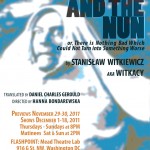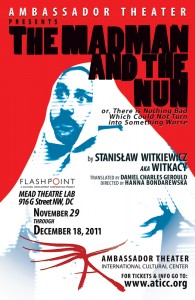
The Ambassador Theater is delighted to present The Madman and the Nun or, There is Nothing Bad Which Could Not Turn into Something Worse by Stanislaw Ignacy Witkiewicz (aka Witkacy), a short play in three acts and four scenes. Â Â 
The Madman and the Nun
Translated by Daniel Gerould
Directed and Produced by Hanna Bondarewska
Set Designed by Daniel Pinha
Costumes by Jen Bevan
Sound and Visual Effects by David Crandall
Lights by Marianne Meadows
Assistant Director James Randle
Stage Manager Adam Adkins
Featuring: John Stange as Alexander Walpurg; Jenny Donovan as Sister Anna; Mary Suib as Sister Barbara, Ivan Zizek as Dr. Jan Bidello; David Berkenbilt as Dr. Ephraim Grűn; Ray Converse as Professor Ernest Walldorff; Jen Bevan and James Randle as Attendants
WHERE:
Mead Theater Lab at Flashpoint, 916 G Street NW, Washington DC
Nov. 29 – Dec. 18, 2011
TICKETS: $30 Gen. Adm.
Students & Senior Citizens $20
On line: http://www.aticc.org/home/box-office or at the door
Media: Please e-mail or call to reserve your seats
WHEN:  November 29 – December 18, 2011
Previews: November 29, 30 at 8 p.m.
Opening: December 1, 2011, 8 PM
Thursdays, Fridays, 8 PM
Saturdays, 2 PM and 8 PM
Sundays, 2 PM and 7:30 PM
The Madman and the Nun is set entirely in a “cell for raving maniacs†in a lunatic asylum, where we meet the madman of the title, the poet Alexander Walpurg, who has been confined here with acute dementia praecox. We are part of a scientific experiment lead by Dr. Grun and his Freudian preconception of curing the patient with the help of Sister Anna, a nun. The author flamboyantly turns everything and everybody into the confusion between the sanity and madness. The play is a strikingly funny attack on both medicine and academia and man’s futile attempt to control the “demons” of existence. Stanislaw Witkiewicz (1885-1939) was a Polish playwright, novelist, painter, photographer and philosopher. “He created a theater of the absurd twenty years before Beckett, Ionesco, and Genet. He himself was a living model of the avant-garde, advancing the frontiers of drama, fiction, aesthetics, philosophy and painting.†Daniel Gerould
Sorry, the comment form is closed at this time.